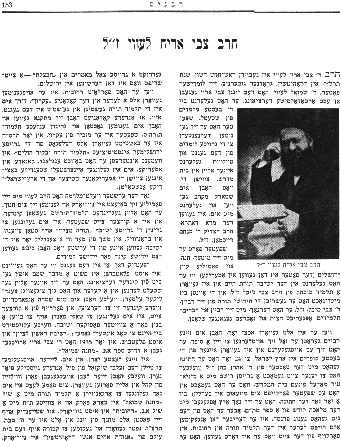
[Page 153]
[Photo:] Rabbi Avi Aryeh Lewy
R. Mendel Kaminetsky
[Photo:] From right, R. Mendel and his father, R. Moshe Isser
R. Mendel Kaminetsky was born on 2 Elul [August 23], 1838 in Drohitchin, and was endowed with great intellectual abilities. He never studied in any yeshiva, and performed extremely well in his studies. Until he was 11 years old he studied and excelled under his father, R. Moshe Isser. Thereafter he studied on his own in the House of Study.
R. Mendel once got involved in an academic dispute with R. Benzion, the rabbi of Belz in the home of Chaim Soloveitchik of Brisk. R. Benzion then commented to R. Mendel, “my son-in-law and your student, R. Yosef Valevelsky, said about you that you have an intellect comparable to that of the great 16th century Talmudic commentator, Rabbi Shmuel Eliezer Eidels. I just laughed, but now I see that he was right.”
Besides being an illustrious Torah scholar, R. Mendel was also involved in general knowledge such as jurisprudence, mathematics, machinery and astronomy. He was also thoroughly fluent in Russian and Russian law, and even wrote a legal petition like a professional lawyer. R. Mendel could read complicated mathematical formulae understand the structure of complicated machinery, and owned a collected of various devices which worked on for many hours. He also had the ability to independently calculate the new moons and intercalation of the calendar.
There is a story of how the Rovno nobleman, Minkov, once went to court to force the Jews of the “new gardens” in Drohitchin to turn the gardens over to him. R. Mendel, as the defense attorney, took the case to the gubernia offices in Grodno and skillfully defended his clients. The result was that the famous and heroic General Minkov, who had conquered the Turkish fortress Plevna, for Russia lost the case. The Russian court ruled that the gardens, which had been developed by Jews for 99 years, should remain in their possession.
R. Hersh Beilin, the Genius of Pinsk, and a friend of R. Chaim Soloveitchik, once exclaimed, “Who can attain R. Mendel's mind?” R. Mendel died on the 3rd of Tevet [December 25], 1919 in Drohitchin. He had 11 children: Yossel, Motya Leib, Lotsa Beila, Pinya, Yehoshua, Lana, Gavriel, Fradel, Shlomo, Miriam and Chana.
R. Asher Weitsel
R. Asher Weitsel, known as “R. Asher the government rabbi [kozinyer rabbin]” was the son of R. Mordechela Weitsel-Rosenblatt, known as “R. Mordechela Slonimer.”
We have no information about R. Asher's life, and especially about his youth. We only know that he got married in Drohitchin to R. Isaac's daughter, and referred to himself as R. Asher Isaacs.
[Photo:] R. Asher Weitsel
R. Asher knew how to study well, and learned the Russian language. Over the years before World War I, R. Asher handled the vital statistics documents of the Drohitchin which recorded the births and deaths of the residents of town, and therefore was nicknamed “Asher the Government Rabbi.”
R. Asher was a very quiet and modest man, and most of the time he was occupied in his shop located in the market. For a short time after World War I he taught religious subjects to children at that Moriah school. He died in the 1920s, and was survived by his son, Benzion, and daughter-in-law, Chana Gittel Valevelsky.
Previous Page
|
Next Page
JewishGen, Inc. makes no representations regarding the accuracy of
the translation. The reader may wish to refer to the original material
for verification.
JewishGen is not responsible for inaccuracies or omissions in the original work and cannot rewrite or edit the text to correct inaccuracies and/or omissions.
Our mission is to produce a translation of the original work and we cannot verify the accuracy of statements or alter facts cited.
 Drogichin, Belarus
Drogichin, Belarus
 Yizkor Book Project
Yizkor Book Project
 JewishGen Home Page
JewishGen Home Page
Copyright © 1999-2025 by JewishGen, Inc.
Updated 13 Dec 2001 by LA